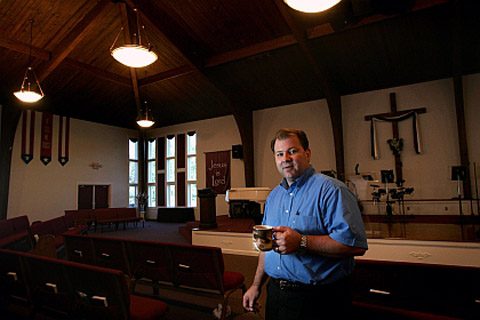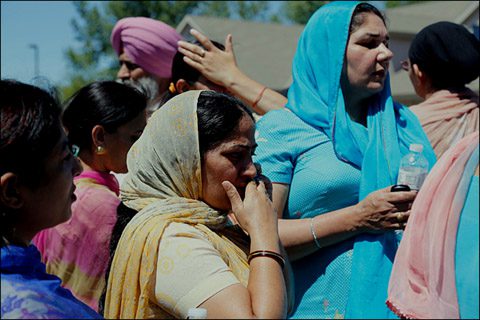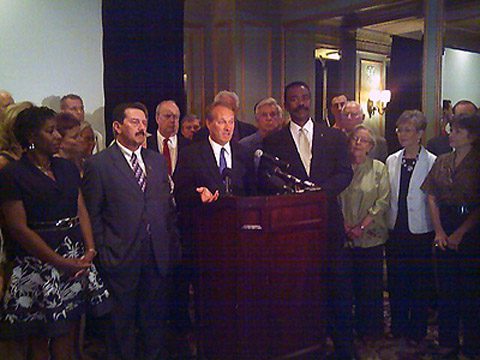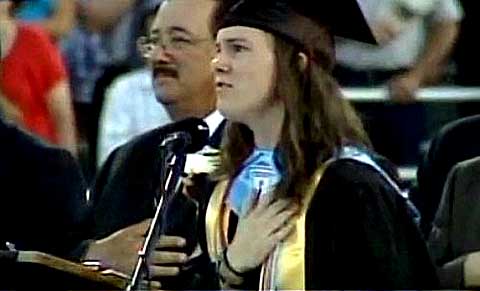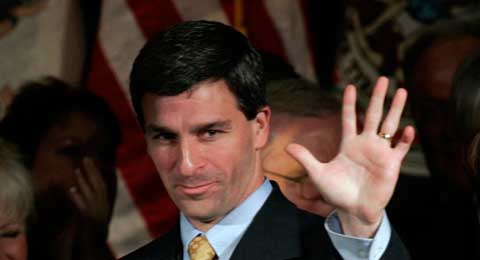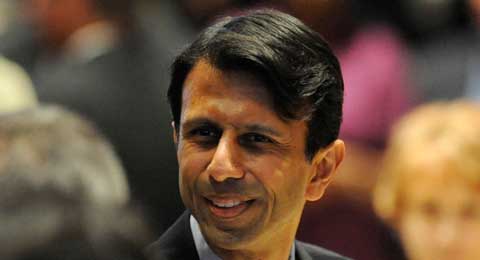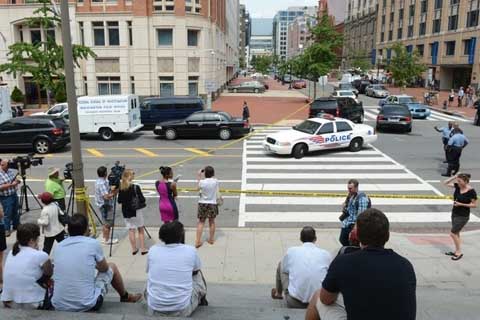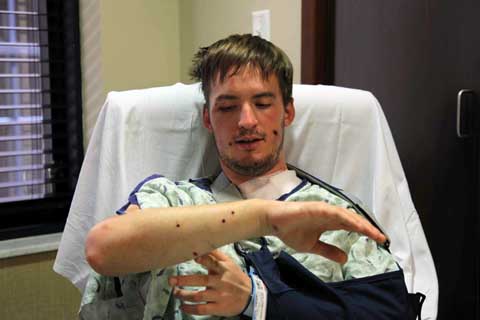Bring guns to church? Pastor Ken Pagano provoked a firestorm when he invited members of Louisville, Kentucky’s New Bethel Church to celebrate the 4th of July and their 2nd Amendment rights by bringing their firearms to church.
Pastor Ken Pagano
The national news media opened fire at the very idea. After all, why should nice church folks need guns to defend themselves?
However, two years later as the nation recoiled from a series of shootings at the Family Research Council in Washington, D.C., a Colorado movie theater and a Wisconsin Sikh worship center, Black Christian News raised the question again: “Should Christians Be Allowed to Carry Guns to Church?” On the international news section of its website, BCN notes a number of overseas attacks on worshipers, including “Leaders in Nigeria Warn of Anarchy After Church/Mosque Shootings.”
Wisconsin Sikhs await word about their loved ones
But are American places of worship under attack? Yes says the Family Research Council and the Liberty Institute, which on Monday released a study of more than 600 documented, recent incidents of hostility to religion in the United States.
“America today would be unrecognizable to our Founders,” said Liberty Institute President, Kelly Shackleford. “Our First Liberty is facing a relentless onslaught from well-funded and aggressive groups and individuals who are using the courts, Congress, and the vast federal bureaucracy to suppress and limit religious freedom. This radicalized minority is driven by an anti-religious ideology that is turning the First Amendment upside down.”
Kelly Shackleford
“As dark as this survey is,” said FRC President Tony Perkins, “there is much light. The secularists’ agenda only advances when those who love liberty are apathetic. Let this be a call to stand for religious liberty in the United States.”
On Monday while they were unveiling their Survey of Religious Hostility in America, a group calling itself Military Atheists and Freethinkers, which has been pressuring the Pentagon to appoint atheist chaplains, was illustrating the reality of their accusations -- denouncing the American Legion for calling for a return to our Christian roots.
“It’s difficult to see military service co-opted to promote religious values above American values,” chastised the atheist group’s president, Jason Torpy, calling for the Legion to repudiate a recent statement by
a Legion official. The atheists said they were offended by this declaration by Ken Governor, the American Legion’s Legislative Commission Chairman:
Jason Torpy
“Activists aim to distort and twist the core values of patriotism, morality and religion that gave birth to our nation, under God," said Governor. "They aim to kick God out of our public squares.
“The nation’s cultural, moral and patriotic values have been under attack for decades, a disheartening trend that continues today. Prayer has been removed from schools. The U.S. flag is no longer protected from desecration.
“References to God on U.S. currency, in the Pledge of Allegiance and on public monuments have been challenged by a minority of voices whose vision for America is far different than that of our founding fathers.”
So, asked Torpy, how dare the Legion commission chairman make such offensive and hateful statements? Torpy advised that such talk about God drives away new American Legion members.
Such hostility to faith is growing, said the Family Research Council and Liberty Institute on the website presenting their report: “The Survey of Religious Hostility in America is a collection of more than 600 cases, detailing religious bigotry throughout America – most of which have occurred within the past 10 years. We invite you to view this powerful document that offers stunning insight into the attacks against people of faith across our nation, and we ask you to stand with us as we continue the important work of defending our most precious liberty – our freedom of religion.
“Hostility against religious liberty has reached an all-time high, and the attacks are increasing at an unprecedented rate. America’s First Liberty – the freedom of religion – is being pushed out of public life, our schools, and even our churches.”
Angela Hildenbrand
For example, notes the website: “Angela Hildenbrand, valedictorian of her class at Medina Valley High, wanted to say a prayer during her graduation ceremony. A fellow student from an agnostic family filed a suit to prevent Hildenbrand from praying. The federal district court judge issued an order prohibiting Hildenbrand from using words like “Lord,” “in Jesus’ name,” and “amen.” The U.S. Court of Appeals for the Fifth Circuit reversed the ruling and allowed the prayer. On June 6, 2011, Hildenbrand gave her speech, which included a prayer.”
The study was released as the Family Research Council’s security guard, Leonardo R. Johnson, continued to recover in the hospital after an armed man entered the group’s Washington, D.C., office last Wednesday, took a gun out of his backpack, told Johnson “I don’t like your politics,” and opened fire, shooting Johnson.
The wounded FRC guard wrestled the gunman to the ground, held him until help arrived and was later praised as a “hero” by District of Columbia Police Chief Cathy Lanier for preventing the shooter from entering the FRC offices and wounding or killing anyone else.
Cuccinelli
So, is it time to start taking firearms to church? In April 2011, Virginia’s Attorney General Ken Cuccinelli ruled that carrying a firearm for self-protection in a church or place of worship is permissible under Virginia law. He was responding to a state legislator’s request to explain a state law which bars firearms in places of worship “without good and sufficient reason” Cuccinelli ruled that “carrying a weapon for personal protection constitutes a good and sufficient reason.”
“Guns are allowed in churches in twenty states as part of their ‘Right to Carry’ laws,” writes Susannah Griffee for the New Yorker magazine. “Versions of them have been enacted in more than forty states.
“In the 1920s and 1930s, many states adopted laws that prohibited the unlicensed concealed carrying of a gun. Vermont is the only state that did not adopt any statutes prohibiting or regulating the concealed carry of guns, and has no specific prohibition against carrying guns in churches.”
In Thomaston, Georgia, the Rev. Jonathan Wilkins told Adelle M. Banks, reporting in USA Today, that his congregation should have the right to carry guns into worship services to protect the congregation.
“Wilkins’ Baptist Tabernacle and a Georgia gun-rights association are challenging a new state law that prohibits weapons in houses of worship,” she noted. “Recently, state legislatures in Georgia, Michigan and Louisiana have been caught in the crossfire of the debate between gun rights and gun control as they consider allowing weapons in houses of worship.
“Though gun-rights proponents think they have both the First and Second Amendments on their side, they also cite the rights of religious organizations as property owners. Opponents, meanwhile, worry that having weapons in worship is part of a slippery slope to permitting them everywhere.
Shortly after Georgia specifically banned guns in church, Louisiana
Gov. Bobby Jindal signed a law permitting them in churches, mosques and synagogues.
Jindal
“Meanwhile, other states are mulling whether to scale back restrictions on weapons,” noted Banks. “In Michigan, gun rights activists are pushing for a change in the law that would make it possible to carry guns in worship without prior permission from a presiding official.”
Why? “Mike Thiede, spokesman for Michigan Gun Owners and a member of a Baptist church,” reported Banks, “said he spoke to legislators in favor of changing the law after a church secretary was assaulted and a pastor was tied up during a robbery.”
During 2009, Dr. George Tiller was shot in the foyer of a Kansas Lutheran church, the Rev. Fred Winters was killed in his Illinois pulpit and the Rev. Carol Daniels was found dead in her Oklahoma church building.
“When you see things like that happening over and over again, churches are saying, ‘What are we supposed to do?’” Jeffrey Hawkins, executive director of the Virginia-based Christian Security Network told Banks.
Laura Cutilletta, senior staff attorney of the San Francisco-based Legal Community Against Violence, told Banks that many states remain silent on weapons and worship – but guns don’t “have a place in public, especially places like churches and bars and places where a lot of people are congregating. An unintentional shooting could end up injuring many people.”
“Laws about weapons in houses of worship vary widely,” wrote Banks. “Some states forbid firearms in religious buildings but others permit them unless a congregation has posted a sign disallowing them. Still others say they’re permitted if the pastor, priest or rabbi gives the OK.”
But, why would anyone feel the need to be armed at church?
Because American politics have become so polarized, says the FRC’s Perkins. He said that “reckless rhetoric” aimed at groups like his had motivated the gunman’s attack at his group’s headquarters. “He singled out the Southern Poverty Law Center,” reported Theo Emery and Michael S. Schmidt for the New York Times, “which characterizes the Family Research Council as a hate group for its political positions on homosexuality.
No longer do Americans agree to disagree, it seems. Instead, some attempt to brand those who debate with them as “haters” – and attempt to ban them from further public discussion.
The gunman “was responsible for firing the shot yesterday that wounded one of our colleagues and our friend Leo Johnson,” Perkins said, but he “was given a license to shoot an unarmed man by organizations like the Southern Poverty Law Center.”
The Family Research Council shooting scene
In a statement on the SPLC’s website, spokesman Mark Potok called Perkins’s accusation “outrageous.” His group recently branded a number of Christian groups which oppose same-sex marriage on moral grounds as “hate groups,” a label they say is a smear – and which they have indignantly demanded the group recant.
The FRC says the American family as an institution is under attack – and that same-gender matrimony weakens not only American families, but U.S. society as a whole.
So, how should people of faith respond? By arming themselves? By being prepared to shoot back – to defend their churches, synagogues and other places of worship with firearms?
The rash of U.S. shootings have “reignited a dialogue on gun rights,” reports Black Christian News – noting that “a new national survey finds that Americans overwhelmingly believe that the constitutional right to own and carry a gun is as important as their constitutional right to free speech.”
That Public Religion Research Institute survey finds 68 percent of U.S. residents rank the right to own guns right up there with “freedom of speech and freedom of the press.”
But there’s a dramatic divide between Democrats and Republicans – with only 28 percent of Democrats supporting gun rights compared to 65 percent of Republicans and 78 percent of Tea Party supporters.
The survey also found that most Americans oppose guns in church – with another sharp divide: 55 percent of Tea Partiers support the right to carry concealed weapons to sites of worship, compared to 9 percent of Democrats.
Two years ago in Louisville when Pastor Pagano offered his congregation the opportunity to bring their guns to a Saturday evening service, “about 200 people took him up on the invitation,” reported the Christian Science Monitor in one of the more restrained news accounts.
The media scrambling for the story
The little church is still recoiling from all the national attention. ABC,
NBC, CBS, Fox and CNN news reporters as well as journalists from the New York Times, BBC, MSNBC, Time, the New York Daily News, USA Today and London’s Daily Telegraph targeted the quiet congregation and its local pastor, none of which expected the mob of reporters brandishing microphones and cameras.
From the pulpit, “We are wanting to send a message that there are legal, civil, intelligent and law-abiding citizens who also own guns,” the Rev. Pagano told the folks in the pews. “If it were not for a deep-seated belief in the right to bear arms, this country would not be here today.”
The press leveled both barrels at the earnest young clergyman. The New York Times went for the racial angle: “The bring-your-gun-to-church day, which will include a $1 raffle of a handgun, firearms safety lessons and a picnic, is another sign that the gun culture in the United States is thriving despite, or perhaps because of, President Obama’s election.”
“A pastor in Kentucky is redefining the tradition of wearing your Sunday best to services by encouraging his congregation to strap on holsters and bring their weapons to church,” fired ABC’s Emily Friedman.
“The guns must be unloaded and private security will check visitors at the door,” reported the Associated Press.
“Pastor,” fired CNN’s John Roberts, “I was doing a lot of looking around this morning at the reaction to the event you had on Saturday night and some of the critics were asking things like ‘Would Jesus carry a weapon?’ And ‘What would Jesus think of a pastor who beat plow shares into swords?’”
“Marian McClure Taylor, executive director of the Kentucky Council of Churches, an umbrella organization for 11 Christian denominations in Kentucky, said Christian churches are promoters of peace, but ‘most allow for arms to be taken up under certain conditions,’” reported MSNBC as if the council of churches was relevant, never mind that it only represents America’s smallest and most liberal denominations while the largest – such as the Roman Catholic Church, the Southern Baptist Convention and the Assemblies of God, with which New Bethel Church is affiliated – shun the organization at the state, national and international levels.
Colorado theater shooting victim Stephen Barton
So, is it a good idea to bring guns to church?
In Aurora, Colorado, a mass shooting occurred at a Century movie theater during a midnight screening of the film The Dark Knight Rises. There was no armed security guard on duty, according to officials. The gunman, dressed in tactical clothing with multiple firearms, killed 12 people and injured 58 others.
At the Family Research Council office in Washington, D.C., a similarly armed gunman was halted at the front door by the security guard – who was shot as he subdued the attacker, but prevented anybody else from being killed or wounded.
A few years ago, a grim-faced Martin Sheen, with an American flag behind him, appeared in a commercial attacking the idea of legislation that would allow individuals to carry "hidden handguns" in, among other places, churches.
"But, the truth is," observes the American Way website, "that making it legal to carry concealed weapons in churches is not as crazy as Sheen and his anti-Second Amendment, anti-self-defense friends at Handgun Control, Inc. would like us to believe.
"In September1999, Larry Gene Ashbrook walked into the Wedgewood Baptist Church in Ft. Worth, Texas, with two guns. He murdered seven people, injured seven others and then killed himself. Two video tapes showed Ashbrook calmly firing his guns. The Acting Police Chief of Ft. Worth, Ralph Mendoza, says these tapes show this cold-blooded murderer committing his massacre in a 'methodical manner,' standing there where he 'fired shot after shot after shot,' pacing back and forth.
"Ashbrook was able to carry out his slaughter at a leisurely pace. Why? Because none of his victims, or anybody else in the church at that time, were armed. Thus, they were sitting ducks and never had a chance.
"In 1993 the Rev. Michael R. Duesterhaus, a Roman Catholic priest at Holy Spirit Catholic Church in Annandale, Virginia, woke up at 3 a.m. to the sound of someone breaking into his study. The priest took out a 9mm pistol, flipped on a light and ordered the intruder to freeze and lie on the floor. The intruder stopped and then reached for his belt. Deusterhaus fired. The man paused, apparently wounded, then ran into the hall. The priest pursued him and fired again, at his feet. The priest then fired a third time, deliberately wide of his target. The man ran out the side door escaping with a small amount of cash."
"The Washington Post noted that this incident "contrasts sharply" with the June, 2000, "brutal slaying" of Monsignor Thomas Wells at the Mother Seaton Catholic Church in Germantown, Maryland, who died after being repeatedly stabbed."
The difference?
One priest was armed. The other was not.
"The idea of a priest or bishop owning a handgun shocks many Catholics," observed Washington Post staff writer Bill Broadway. "But some do, whether for hunting, target practice or self-defense, and church law allows it. But theologians and ethicists differ on whether priests should ever point a weapon at another person -- and fire.
"Duesterhaus, then 28, shot at the intruder, and he and three other priests living in the Holy Spirit rectory were unharmed. Wells, 56, who stayed alone in the rectory at Mother Seton Catholic Church, died after being stabbed repeatedly in a violent struggle.
"Would the outcome have been different if Wells had owned a handgun? John M. Snyder, 60, a Catholic layman and chief lobbyist for the Washington-based Citizens Committee for the Right to Keep and Bear Arms, believes so," wrote Broadway.
"On June 9, the day after Wells's body was found, Snyder released a statement saying Wells 'most likely would be alive today if he'd had a loaded handgun and knew how to use it.'
"Washington Auxiliary Bishop William E. Lori objected strongly," reported Broadway. "He called the suggestion that priests be encouraged to own handguns for self-defense 'unworthy of Monsignor Wells's memory.' The Rev. Aaron Joseph Coty, administrator of Mother Seton parish, finds abhorrent the idea that priests -- or anyone, for that matter -- own handguns. 'You don't need weapons to defend yourself,' he said. 'There are other ways. You can talk with the person, reason with the person, get into a fistfight.'
But the Rev. Robert J. Rippy, chancellor of the Diocese of Arlington, has a different view. "A priest, like any other citizen, has a right to self-preservation," he told the Arlington Catholic Herald after the Duesterhaus incident. "A person has a right to preserve their life from an unjust aggressor."
